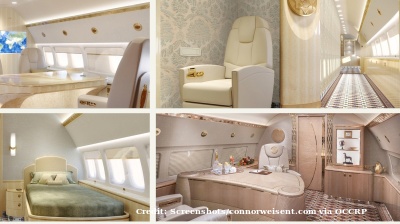
Why buy a car when you can lease one? The option of leasing vehicles is perfect for Russia’s fast-growing economy. Following the collapse of the Soviet Union no one had any money, but there were opportunities galore for anyone with a decent business idea. The trick was to get hold of some cash to get the business off the ground. Into this world was born Europlan that provided small and medium-sized enterprises (SME) a way to get cars, vans and trucks in a way they could afford and scale.
Europlan was born from a circle of bankers that grew out of the USAID funded project that led to the establishment of Delta Bank, Russia’s first bank to focus on mortgage at the end of the 90s.
The Delta Bank spawned a number of ventures including Delta Credit, Delta Capital, a private equity fund run by Kirill Dmitriev, who is now head of Russia’s sovereign wealth fund, the Russian Direct Investment Fund (RDIF), and Delta Leasing, among other things.
Europlan’s CEO Alexander Mikhailov has been with the firm for 20 years since the beginning and has seen the market grow through turbulence and booms as Russia’s financial sector develops. In the early days Delta Capital was just trying to promote car loans to try and get the banks to get out of the [sovereign treasury bill] GKO market and offer financial products that were useful to people, says Mikhailov.
“At the time banks were not really interested in consumer orientated loans and primarily doing big ticket business. Delta Leasing grew from one of those initiatives,” Mikhailov told bne IntelliNews in an exclusive interview.
One of Europlan’s founders, Nikolai Zarovige, was a member of the Delta Leasing team and helped build up the business.
BVCP
Then in 2003 Delta Group started to sell all its assets. The programme is only designed to kick start financial sector businesses, but once those business start to obtain critical mass the funds and banks that have been created are sold off – often to the management in an MBO.
Delta Credit was sold to the French bank Société Générale that had big plans for the Russian market. Delta Bank was sold to the US banking giant GE that had similar plans. And Delta Leasing was sold to Barings Vostok Capital Management, the leading private equity fund founded and run by Russia’s most famous fund manager Michael Calvey.
Well respected and with a string of hugely successful investments under his belt, Calvey ended up in the Klieg lights when he was arrested on trumped up embezzlement charges two years ago and put on trial. Involved in some of the most successful private equity deals in Russia, such as being an early investor into Russia’s Internet powerhouse Yandex, Calvey saw the potential in leasing and bought Delta Leasing, giving some of the equity to then-management team.
Early on Delta Leasing bought the leasing business of leading car dealership Rolf, which had established itself as one of Russia’s top distributors of foreign made cars. bne IntelliNews interviewed Rolf’s founder Sergei Petrov, who has become a legend in Russia’s car business, but like Calvey he ran foul of vested interests in 2019 and was forced to sell.
As part of Rolf’s business Petrov set up Rolf Leasing, but as it was never a core part of his dealership business, he sold the subsidiary to Calvey and Delta Leasing in 2004.
Over the next eleven years the management built the business up as leasing slowly became more popular and what eventually became Europlan. The company was then acquired by Safmar Group belonging to the Gutseriev family in September 2015 from Barings and a 25% minus one share stake was listed on Moscow Exchange (MOEX) in the first leasing company listing ever in Russia.
The Russian tycoon Mikhail Gutseriev was recently named in the EU sanctions imposed on Belarus. However, he has no ownership of Safmar Financial, which is led by Said Gutseriev and owns Europlan, and the sanctions do not extend to Safmar Financial nor Europlan, the Group said in a statement.
Said Gutseriev, the son of Mikhail Gutseriev is emerging as one of Russia’s leading entrepreneurs and amongst his many other holdings is consumer electronics giant M.Video-Eldorado, now the largest electronics retailer in Europe, as well as a number of financial services companies.
Leasing business
Europlan is basically a financial company, not a car company. What is does is raises cheap and long-term funds to buy cars which it then leases to customers in Russia. In the early days most of the clients were leasing truck and vans to support small and medium sized enterprises as leasing is an attractive alternative to buying trucks for a young growing business. Today the profile has changed. The trucks and vans still account for half the business, but a car leasing business now accounts for the other half, especially catering to large corporations who need company cars.
But what makes Europlan unusual is that it raised almost all its funding in the first decade from foreign lenders and development banks in particular.
“Private equity firms helped and that fully concentrated us on shareholders’ value creation,” said Mikhailov.“We never lost focus on that, even in the worst of the 2008 crisis.
The management team was given a free hand to run the business, but as it was born out of a US programme and then taken over by a foreign managed private equity fund, Europlan has been steeped in the best practices corporate governance and total transparency, which are now deeply rooted in its corporate DNA.
And the multilateral development banks (MDBs) loved it. Europlan hit all their sweet spots: a local financial services company that was helping the development of SMEs but had perfect books and a squeaky clean business model. In the wild days of the late 90s and early noughties it was hard to find a Russian company with need for capital with anything like a similar profile. The MDBs were queuing up to lend Europlan money.
“We took five loans from the EBRD since 2002. No one else was doing that many deals with them then. We took two from either [the German SME development banks] KfW and DEG and more from Dutch FMO, Black Sea Trade and Development bank, the U.S. UPS Capital Business Credit, IFC as well as two from [the US development bank, the Overseas Private Investment Corporation],” said Mikhailov.
“We were a way for these foreign institutions to target consumers and SME via the vehicle leasing. Some banks that lent directly to SMEs lost their money a lot of the time. But we had a proven business, backed by a concrete tradable asset that followed all their best practices, made a return and earned good margins,” Mikhailov added.
Access to the MDB money was also a competitive advantage as this financing was cheaper with longer maturities than anything available from the domestic banks, allowing Europlan to offer very competitive packages to other forms of financing cars and truck and still earn a healthy margin on the business.
That all changed in the 2014 oil price shock and deep devaluation of the ruble. The 2014 crisis transformed the way Russia’s market worked. Even after the 2008 crisis dollar-pricing was the norm for most businesses. The prices for cars, a square meter of office space, even the steak on a menu in a posh restaurant, was listed in dollars, even if the bill was paid in rubles. The authorities tried to stamp out the practise by outlawing it, but all that happened was everyone started using “y.e.” or “equivalent units” which happened to be the same as the value of a dollar that day.
But that came to an abrupt end in 2014. The depth of the rubles crash, which fell from around RUB35 to the dollar to RUB80 at its nadir, forced everyone to price in rubles as the FX risks associated with pricing contracts in dollars were now intolerable.
“In 2008 we were forced to turn to the Russian banks for funding. But it turned out to be no problem. Thanks to our PE background and MDB upbringing we were also exemplary borrowers for Russian banks too and they were more than happy to lend to us,” said Mikhailov.
Europlan organised a syndicated loan in Russia amongst the development banks in 2008– just a month before the global meltdown – and its first ruble bond. Ever the innovator in 2018 the company went on to organise the first syndicated loan amongst Russian banks.
Today debt finance is the main source of funding: half of the money Europlan needs is raised from bond issues and the other half is from Russian traditional loans.
Talking about the Russian car leasing market evolution over the years, Mikhailov says: “It was very small in 2004 and it has grown a lot since then but the penetration is still only about 9.6% (the passenger car segment), compared to the 39% in the EU six biggest countries and 33% in the EU27,” said Mikhailov. “There are circa 1.5mn new cars sold every year in Russia. That makes the market in the top five in Europe.”
That is the equivalent of billions of dollars a year spent on cars and trucks and the average growth rate of the market over the last four years has been 24% in ruble terms.
“In Europe the private leasing to individuals is a big business but in Russia it is still mostly a B2B market. SMEs are buying fleets of office cars to motivate their staff or for delivery services, said Mikhailov. “The leasing business is still under development.”
One of the things that frustrates Mikhailov is that Russians still prefer to save up and buy a car outright rather than get the car now with financing and pay it off slowly. And when they do finance it, most Russians take an auto loan from a bank.
“In Russia approx. 50% of car sales are direct purchase. That is crazy! In the US over 85% of all purchases are funded,” said Mikhailov.
Leasing should be particularly appealing for a market where real disposable incomes have been stagnating for most of the last eight years.
The appeal of leasing has fallen too recently as the Central Bank of Russia (CBR) reversed six years of rate cuts and started hiking again thanks to a surge in inflation since the start of this year.
“Why are those people not using financial services. The cost of credit is still high for people. Its 5,5% Central bank rate, plus the real rates of around 9%. It makes most people prefer to buy with cash. But when the rates were falling you could see the effect on our business and on the whole economy,” said Mikhailov.
Car leasing, on the other hand, is experiencing explosive growth, especially as at the end of 2020, and is expected to remain one of the market drivers in 2021, according to forecasts by Expert RA.
Europlan was growing in double digits even when the cost of funding was in double digits in ruble terms thanks to the underpenetration.
“By the end of 2020 there was no drop in leases. The dealerships were closed in April and May but by June and July car sale started to grow again and by the end of the year there was a big increase in sales. Leasing followed these trends. We grew by +25% in leasing portfolio and +19% in new business generation in 2020 to 2019,” said Mikhailov.
Features

Global leaders gather in Gyeongju to shape APEC cooperation
Global leaders are arriving in Gyeongju, the cultural hub of North Gyeongsang Province, as South Korea hosts the Asia Pacific Economic Cooperation summit. Delegates from 21 member economies are expected to discuss trade, technology and security.

Project Matador marks new South Korea-US nuclear collaboration
Fermi America, a private energy developer in the United States, is moving ahead with what could become one of the most significant privately financed clean energy projects globally.

CEE needs a new growth model as FDI plunges
wiiw economist Richard Grieveson says the CEE region’s long-standing model of attracting FDI through low labour costs no longer works.
KSE: Ukraine is facing a $53bn budget shortfall, but economy is stable for now
Ukraine is in urgent need of additional financing from partners as the continuation of the war drives up defence spending and reconstruction needs, jeopardizes budget financing, weighs on the balance of payments, and slows economic growth.




